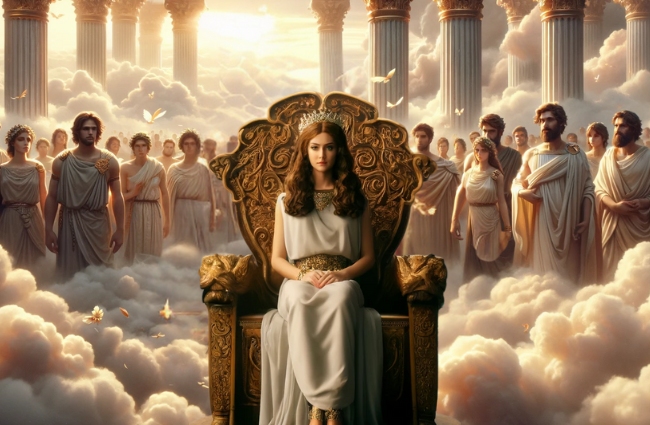Home » Hera’s Friends, Enemies, Known Rivals and People She Hated
Hera’s Friends, Enemies, Known Rivals and People She Hated
As the wife of Zeus, she often found herself entangled in his numerous affairs, leading to her legendary bouts of rage.
And that’s why Hera’s friends were few but her enemies and rivals were many.
She was the goddess of marriage, so her husband’s infidelities were not only personal betrayals but also public challenges to the values she embodied.
Since she couldn’t punish him because he was king of the gods, she always took her frustrations out on the other women.
It’s the main reason why so many of Hera’s rivals were female.
But there are other reasons why she had so few allies. Her need for control often alienated others, even among the gods.
In this blog post, we take a deep dive into the intricate dynamics that make up her relationships.
From Hera’s friends to her most hated enemies, see who played a crucial role in her life and who became her rival.
Hera’s Friends

Here’s a list of Hera’s friends and allies:
1. Hebe – As Hebe’s mother, she cared for her deeply. Hebe served as the cupbearer for the gods, embodying youth and vitality. Her pride in Hebe’s role among the gods further solidified their loving and supportive relationship.
2. Eileithyia – They shared a close bond. As mother and daughter, she valued Eileithyia’s role as the goddess of childbirth, aiding women in labor and ensuring safe deliveries. She often used Eileithyia’s expertise to enforce her will in manipulating outcomes for her own benefit.
3. Hestia – As the goddess of the hearth and domesticity, Hestia was gentle and non-confrontational. This made her a friend of Hera (and many others), even though there aren’t lots of stories of them doing things together. Hestia provided a calming influence within the often turbulent dynamics of Olympus, which made her easy to get along with.
4. Demeter – They got along well. They were both headstrong goddesses with important roles, and they shared mutual respect. Of course, their bond was strengthened by their familial ties as sisters. Their shared experiences as mothers also brought them closer, uniting them during crises such as the abduction of Persephone.
5. Iris – As the goddess of the rainbow and a messenger of the gods, she served all of Olympus but is often depicted as one of Hera’s known associates and a personal messenger to the goddess. Her role in relaying the commands and assisting her in various myths shows a relationship of trust and utility.
6. Hades – The relationship between the two is marked by a profound respect towards each other’s dominions. She acknowledges Hades’s role in the underworld, maintaining a diplomatic peace that seldom sees interference in each other’s affairs. So he’s one of the few people in the Greek pantheon that didn’t become an enemy of the goddess.
7. Persephone – They got along because they shared mutual respect and understanding. Both goddesses held significant roles in the divine hierarchy, with one as queen and Persephone as queen of the Underworld.
Hera’s friends and allies were people that aligned with her own objectives, instead of being based purely on emotional or personal bonds.
List of Hera’s Rivals

There aren’t too many gods or goddesses in the Greek pantheon that were formidable enough to be called a true rival of Goddess Hera.
Here are some notable ones:
Zeus: Even though they were married, he was the primary rival of Hera due to his numerous infidelities. Each affair he had brought new anger and bitterness into their relationship. Despite her role as the goddess of marriage, her own marital status was fraught with tension and conflict. So even with the powers she had and her status as the queen of the gods, she struggled with the constant humiliation and betrayal from Zeus.
Aphrodite: The goddess of love and beauty, Aphrodite often clashed with the queen of the gods, especially in stories involving love and beauty contests. The most famous of course is the Judgment of Paris. Aphrodite also used her control over the domains of love and sexuality to influence many of Zeus’s affairs. Naturally, she became one of Hera’s enemies.
Athena: Although not a direct rival in many myths, they were competitors in the Judgment of Paris, each offering Paris rewards in exchange for declaring them the fairest. This rivalry was more about prestige and honor rather than personal vendetta. Athena, as the goddess of wisdom and war was a very formidable opponent.
Artemis and Apollo: As the children of one of Zeus’s mistresses, Artemis and Apollo were subjected to her wrath due to their mother’s relationship with Zeus. And because they went on to become popular deities in their own right. She tried to prevent their birth and even after they were born, continued to interfere in their lives. Her hostility was reflected in various tales, where she poses challenges and sends creatures to thwart their efforts.
These ancient figures became Hera’s rivals mostly through no fault of their own.
Other People Hera Hated
Here’s some more people Hera hated that made her angry:
Hercules: He was perhaps one of the most famous people she hated because he was Zeus’s son with another woman. She attempted to kill him as a baby and later instigated the twelve labors that defined his myth. You can see the full story of their relationship in our guide to the famous myths about Hera.
Trojans: She hated the Trojans. And throughout the Trojan War she actively supported the Greeks, using her influence to hinder and harm the Trojans at every opportunity. Her disdain stemmed from the Judgment of Paris, where Trojan prince Paris did not choose her as the fairest. This slight fueled her relentless pursuit of Troy’s destruction, once again showcasing her personality and ruthless nature and the lengths she would go to exact retribution.
Paris: She was really angry at Paris for not choosing her as the fairest goddess. She held a grudge against him and the city of Troy, which led to her supporting the Greeks during the Trojan War. Her anger stemmed from Paris choosing Aphrodite instead, after being promised the love of the most beautiful mortal woman. This decision not only contributed to the epic scale and devastation of the war, but also made him one of Hera’s enemies for life.
Dionysus: was the son of Zeus and his mistress, so the goddess hated him from birth. Her hatred led her to disrupt his life constantly, driving him into madness multiple times. Despite these challenges, he grew to embody resilience and transformation. Ultimately, he became an influential figure in mythology, celebrated for his role as the god of wine and festivity.
Nereids: The goddess did not like the Nereids, particularly Thetis, because of a prophecy that her son would be greater than Zeus. This fear of being overthrown sparked her opposition to Thetis marrying any god, driving her to ensure that Thetis would marry a mortal instead, thus limiting the potential threat.
Asteria: A Titaness who fled from Zeus’s advances by transforming into a quail and diving into the sea. She was one of the people Hera hated simply because of her relation to one of Zeus’s not-so-secret lovers. This animosity extended to anyone connected to her rival, showcasing her tendency to hold grudges that influenced her actions against multiple generations. Her disdain for Asteria yet again highlighted her personality and the depths of her vindictiveness.
Pasiphae: As the wife of Minos, she faced disfavor due to her connection with Zeus through family lineage, which brought complex dynamics to the family relationships. This familial tension underscored the challenges of navigating relationships within a divine lineage where allegiances and resentments run deep.
Megara: The first wife of Hercules, Megara suffered because of the goddess’ grudge against him. She manipulated him into madness, resulting in the tragic death of Megara and their children. This tragic event affected innocent lives and demonstrated the widespread fallout from her divine conflicts.
Chelone: Hera hated Chelone because she was a nymph who refused to attend her wedding with Zeus. So she was turned into a tortoise as punishment. This transformation symbolized the consequences of defiance against the gods, underscoring the severe reprisals for those who opposed the authority of this goddess.
Conclusion of Hera’s Friends and Rivals
Her relationships with gods, goddesses, and mortals alike reveal her to be a protector of marriage and a punisher of those who committed adultery.
Hera’s friends were those that didn’t betray her in some way. Or with people that she felt didn’t pose a threat to her authority.
Other than that, there are no instances mentioned in ancient writings about her becoming close with anyone in the Greek pantheon other than her husband.
Most writings about her have to do with her reactions and overreactions to her husband’s cheating ways.
Naturally, Hera’s rivals and most of the people she hated were because of these betrayals.
Or because she perceived someone to be a threat to her authority. Each betrayal was met with swift and severe consequences.
That’s why her enemies list was so long, and her list of allies was so short.
She rarely forgave those who wronged her, making her one of the most feared goddesses in Greek mythology.
Hera’s friends and large list of enemies are a big part of what makes her mythology so riveting.
Related Articles
Table of Contents
2024 All rights reserved.
